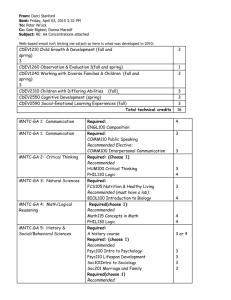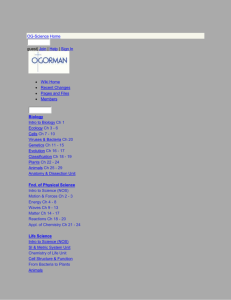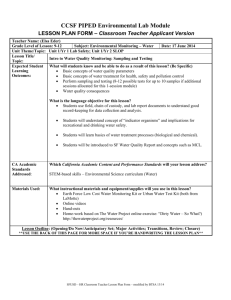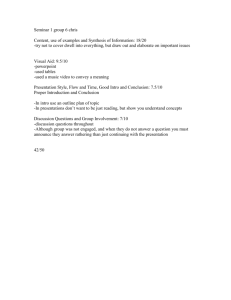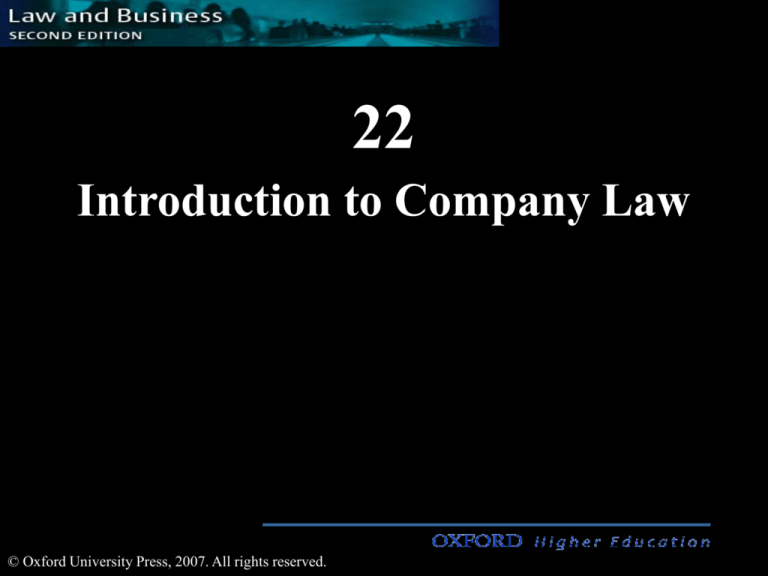
22
Introduction to Company Law
© Oxford University Press, 2007. All rights reserved.
Intro to Company Law cont…
Learning Objectives:
• Explain the different types of company structures;
• Understand the essential elements of incorporation;
• Understand the role of company regulation both internal and
external, especially the obligations imposed upon company
directors for corporate governance, insolvent trading and
financial reporting;
• Explain the relationship that external stakeholders, company
auditors and creditors have with the company;
• Understand the role, functions and powers of ASIC.
Intro to Company Law cont…
• Companies have evolved to become one of the
primary types of business structures in the
Western world.
• The popularity of the corporate entity as a
primary choice for businesses to employ is
testament to the many advantages offered by
the companies.
Intro to Company Law cont…
Types of Companies
Dependent upon size and capital structure and
include:• Limited liability (shares);
• Limited liability (guarantee);
• No-liability company.
• Small v Large Proprietary Companies
Intro to Company Law cont…
PUBLIC COMPANY
NO LIABILITY
LIMITED BY
SHARES
LIMITED BY
GUARANTEE
UNLIMITED
LIABILITY
PROPRIETARY COMPANY
CAPITAL
STRUCTURE
LIMITED BY
SHARES
UNLIMITED
SIZE
LARGE
(ANY 2 OUT OF 3
BELOW)
SMALL
(ANY 2 OUT OF 3
BELOW)
(1)
REVENUE>
$10 MILLION
(1)
REVENUE<
$10 MILLION
(2)
ASSETS>
$5 MILLION
(2)
ASSETS<
$5 MILLION
(3)
EMPLOYEES>
50
(3)
EMPLOYEES<
50
Intro to Company Law cont ...
Essential Features of a Company
• Corporate entity structure v other forms of business
structure.
• Separate legal entity;
• Separation of management from control.
• Students should be made aware of these essential
features particularly how the two concepts interact
with each other.
See: Salomon v Salomon [1897] AC 22.
Intro to Company Law cont ...
Appointment and Removal of Company Directors
Part 2D.3 of the Corporations Act
• Rules relating to:• appointment,
• remuneration and
• removal of company directors.
Intro to Company Law cont ...
Appointment and Removal of Company
Directors
Distinguish between:• proprietary and public companies,
• different rules apply for the removal of
company directors regarding public v
proprietary companies.
Intro to Company Law cont ...
Financial Records and Reports
• Chapter 2M of the Corporations Act governs the
requirements of companies to keep and prepare financial
records and financial reports.
• contain a correct record and explanation of transactions,
financial position and performance;
• enable true and fair financial statements to be prepared and
audited
• Half-yearly reporting by listed companies
• Annual Directors’ Report
• Audit Report
Intro to Company Law cont ...
Annual Reports
• The annual financial reports must contain
the following information:• the financial statements for the year;
• the notes to the financial statements; and
• the directors’ declaration about the
statement and notes.
Intro to Company Law cont ...
Directors’ Declaration: s.295A
• Must be in writing;
• state that the financial records of the company have been properly
maintained in accordance with s.286;
• state that the financial records and notes comply with relevant
accounting standards in accordance with s.296;
• state that the financial records and notes provide a true and fair view of
the financial position and performance of the company in accordance
with s.297;
• specify the date on which the declaration is made;
• specify the capacity in which the person is making the declaration;
• be signed by the person making the declaration.
Intro to Company Law cont ...
Half Yearly Reports
• Publicly listed entity must prepare half-year
financial reports and a directors’ report
• Half-yearly reports in addition to annual
reporting requirements
• Does not apply to proprietary companies
Intro to Company Law cont ...
Annual Directors’ Report
• a review of operations and the results of those operations during
the year;
• details of any significant changes in the entity’s state of affairs;
• state the entity’s principal activities for the year;
• provide details of any matter or circumstance that may have a
significant effect on the company’s operations or results in future
financial years;
• provide details of likely developments in the company’s operations
in future years;
• provide details of any environmental legislation that may affect the
company’s performance.
Intro to Company Law cont ...
Audit Report
• Compliance with Corporations Act &
relevant accounting standards.
• Provide a true and fair view of
company’s performance.
• Company has sufficient financial records.
• Auditor has required information.
Intro to Company Law cont ...
Contracting with a Company
Formal Authority
• Agency: s.126;
• Direct: s.127
• Execution with a seal: s.127(2)
• Execution without a seal: s.127(1)
Intro to Company Law cont ...
Statutory v Common Law
At Common Law three specific categories
of authority:
• express actual,
• implied actual and
• apparent authority.
Intro to Company Law cont ...
Statutory Assumptions
• Sections 126, 127 and 129 provide for
additional safeguards to outsiders
contracting with companies
• Section 129(2) ASIC Records
• Section 129(3) Holding Out
Intro to Company Law cont ...
Advantages of Statutory Assumptions
•
•
•
•
•
•
Broader Application c/f common law.
Burden of proof on company for reasonable suspicion.
Outsider entitled to rely on statutory assumptions.
Assumptions are cumulative.
Assumptions apply even if there is fraud by an agent.
Outsider cannot rely if the agent “knew or suspected”
breach.
Intro to Company Law cont ...
Company Regulation
• Internal Regulation v External
Regulation
• Constitution v Replaceable Rules or Both
• External Regulation by ASIC &
Corporations Act 2001 (Cth)
Intro to Company Law cont ...
Company’s Constitution v Replaceable Rules
ABC Pty Ltd
ABC elects to have a
constitution
ABC Constitution
ABC can elect both:
Constitution &
Replaceable Rules:
S.134
ABC elects to be
governed by the
replaceable
rules:S.135
Replaceable Rules
Table: S.141
Intro to Company Law cont ...
Amending a Company’s Constitution
• Can be modified by special resolution
• Special Resolution must be lodged with
ASIC within 14 days
Intro to Company Law cont ...
Replaceable Rules: s.135
• Pre 1 July 1998 Coy can have Constitution
or Replaceable Rules or both.
• After 1 July 1998 can adopt Replaceable
Rules.
Pre/Post 1 July 1998 Regime:
Internal Management Rules
Pre-1July 1998 Companies
Post- 1 July 1998 Companies
Memorandum and Articles of Association=
Company's Constitution
Coy's constitution may comprise:
OR (in default):
* Special Resolutions OR
* Contained in a document upon registration
OR (in default):
Tables A & B (Corporations Act)
(Model rules for coy's limited by shares & no
liability coy's)
REPLACEABLE RULES (see:S.141 Table)
OR :
OR:
A combination of both (S.134)
(referred to as modified Table A Articles)
A combination of both (S.134).
...................................................................
...........................................................
Advantage of replacement rules :
Any updates in the Corporations Act automatically
amend the internal rules of these coy's and the
coy's constitution is always up to date with the
Corporations Act. (Compare with Tables A and B
that remain static).
Pre-1 July 1998 Coy's may continue to operate as
before, or repeal their memorandum and articles
of association entirely and move into the new
regime (Post-1July 1998).
Intro to Company Law cont ...
External Regulation
• Corporations Act
• ASIC
• Corporate Crime & Corporate
Governance
• See: R v Rivkin (2003) 198 ALR 400.
Intro to Company Law cont ...
No of Criminals
Corporate Criminals 2001-2004
CRIMINALS JAILED BY ASIC 2001-2004
35
30
25
2001-02
20
2002-03
15
2003-04
10
5
0
1
2001-2004
Intro to Company Law cont ...
Civil Penalty Orders
Applied for contraventions of the Corporations Act
including:• Insider Trading:-s.1043A(1) & (2);
• False Trading & Market Rigging:- ss.1041B(1) and C(1);
• Market Manipulation:-s.1041A;
• Insolvent Trading:-s.588G(2);
• Failure to comply with Financial Reporting Requirements:s.344(1);
• Duties of Officers of the Company:-s.601FD(3).
Intro to Company Law cont ...
Civil Penalty Orders ASIC 2001-2004
CIVIL PENALTY ORDERS BY ASIC 2001-2004
118
140
2001-02
2002-03
2003-04
151
Intro to Company Law cont ...
Investigation & Enforcement ASIC
% SUCESSFUL LITIGATION: ASIC
100
92
94
93
70
70
70
2001-02
2002-03
2003-04
PERCENT
80
60
40
20
0
2001-2004
Intro to Company Law cont ...
MEETINGS
Generally, there are three broad classes of meetings
that may be convened:• Board Meetings;
• Shareholder meetings which may include:- Annual
General Meetings (AGM); Class Meetings and
Extraordinary General Meetings (EGM);
• Court Ordered Meetings.
Intro to Company Law cont ...
Quorum & Proxy
• At least 2 members in a quorum
• Must be present at vote
• Proxy can be appointed by a member
• Proxy can be an entity or individual
• Proxy has same rights as the member including:– to speak at the meeting;
– to vote; and
– to join in a demand for a poll.
Intro to Company Law cont ...
Notice Procedures
Member’s must be notified at least 21 days before the meeting is held
in the following ways:• personally; or
• by sending in post to the members address as it appears on the register
of members;
• by sending by fax or email;
• by notifying the member by other electronic means nominated by the
member;
• by any other means provided by the company’s constitution.
Intro to Company Law cont ...
Contents of notice
• A notice of a meeting of shareholders must provide the
following information:• set out the place, date and time for the meeting;
• state the general nature of the shareholders’ meeting;
• if a special resolution is to be proposed at the meeting- set
out the intention to propose the special resolution and
provide details of the resolution;
• if a member is entitled to appoint a proxy- provide a
statement setting out proxy’s rights and entitlement to vote
at the meeting.
Intro to Company Law cont ...
Types of Meetings
• Annual General Meeting (AGM)
• Extraordinary General Meeting (EGM)
• Boardroom Meetings
• Class Meetings
• Court Intervention
Intro to Company Law cont ...
Share Transactions Affecting Share Capital
• Issuing New Shares
• Payment of dividends
• Share buy-backs
Intro to Company Law cont ...
Issue Shares
• bonus shares
• preference shares
• partly-paid shares
Intro to Company Law cont ...
Payment of Dividends
• Only out of profits
• Capital Maintenance Requirement
• Declaring a Dividend v Payment of
Dividend
Intro to Company Law cont ...
Maintenance of Share Capital
• dividends can only be paid out of ‘profits’, not capital;
• redeemable preference shares must be redeemed out of
profits, or the proceeds of a new issue of shares; and
• general prohibition against a co dealing in its own
shares (Part 2J.2).
• Doctrine modified by Corporations Act.
Intro to Company Law cont ...
Share Buy-Backs
Company may undertake a buy-back of its shares in the
following ways:• employee share scheme;
• on-market;
• equal access scheme and
• selective buy-back.
Intro to Company Law cont ...
CORPORATE GOVERNANCE
• CLERP 9 Recommendations
• CLERP (Audit Reform & Corporate Disclosure) Act 2004
(Cth).
• Independence of the company auditor
• Corporate disclosures requirements
• International Accounting Standards & Australian
Equivalents
• United States has enacted similar legislation in the form of
Sarbanes-Oxley Act.

